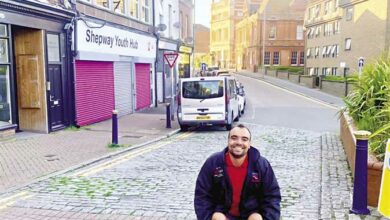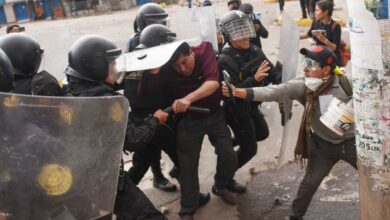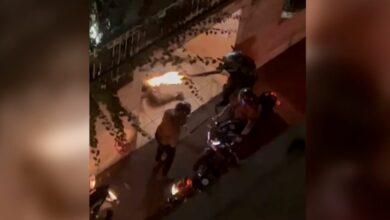Hussein Zakaria Abdelsalam woke up on 28 January 2011 and made his way to his weekly soccer game from the home he shares with his family in Shobra. When the 24-year-old worker went to Monufiya, where the game was held, he knew that some protests had happened a few days before, but not much else. He took a bus ride to the field with his team only to find it empty and eerily calm.
No one had informed them that the game was cancelled. After some fruitless investigations, Hussein and his teammates shrugged their shoulders and took the bus back home. They were dropped off, as usual, ten minutes' walk from home. Walking with teammate and neighbor Abdelaziz, Hussein saw white clouds in the air that made breathing difficult and stung his eyes, so they sped up.
The streets were full of rocks and Pepsi bottles, and no human beings but a row of uniformed policemen. Hussein knew he had nothing to do with the police and was always taught to avoid them, so he turned his back to them and walked away. The next thing he felt was a bolt of electricity run through his body. He woke up a day later at Demerdash hospital, paralyzed from the waist down. A police officer had shot him in the back as he walked away, puncturing his spinal cord.
Hussein was never politically active and wouldn’t have been caught in the crossfire had he heard about the turmoil on the Friday of Anger.
The only problem is he can’t hear. He is deaf and mute.
Assistance for Egyptians with disabilities is incredibly deficient, especially for the deaf and mute who are not able to verbally convey their misgivings. Since the end of the 25 January revolution, Egypt's deaf and mute have added their demands to those of other special interest groups around the country who believe that their rights haven’t been given enough attention.
“We are only asking for our legal rights,” explains Galal Farag Galal. These rights include 50% off public transportation prices, a 5% quota of all government jobs and free specialized education. “It is rare that we receive any of these,” he adds.
“Education for the deaf and mute is pitiful,” Hanan Mohsen says. Hanan, who works in the Ministry of Education’s department for disability education, thinks that a majority of the deaf population in Egypt are marginalized and not helped to understand what is going on around them.
“The right to knowledge is one of the most important things we are asking for,” she adds. Many stories of individuals injured during the 25 January revolution have emerged within the deaf and mute community.
Emad Taha Mubarak is another such case. The 34-year-old works at an advertising agency in the neighborhood of Faisal. He was walking by the Maspero building in downtown Cairo on Thursday 27 January when he came across policemen waving at him violently. “I didn’t know what they wanted, so I walked toward them. Immediately I got punched in the face and shot in the foot with rubber bullets. They kept beating me up until I was unconscious,” he explains.
Mubarak woke up missing four teeth, his cell phone, and the month’s salary which he had just received. “I woke up the next day on the street, and saw what looked like a war zone.” With no money and no cell phone to ask friends to pick him up he began walking home with his injuries. Not knowing that the Friday of Anger had erupted, Mubarak saw uniformed policemen beating and shooting people in the streets as they had done to him the night before. “Then I saw a police vehicle drive through the crowds and kill a man. I lost my mind then, and joined people in attacking the police and burning their cars.” He only found out later in the day that he was playing a part in a revolution, and later went to Tahrir Sqaure to join protesters there until “the other Mubarak” stepped down.
After the revolution another spontaneous combustion of human emotion happened, that of the deaf and mute, who feel like society as a whole has not paid enough attention to their needs lately. “There is almost no adequate assistance from the government for the deaf and mute population in Egypt as a whole,” said Mohsen. She estimates this population at around 4 million. “That is why since 11 February we have all been communicating from around Egypt. Yesterday people from Port Said, Arish, Suez and Alexandria came to protest with us,” said 32-year-old Sayyed Abdelrahman.
At its peak on Friday 18 February, around 4000 deaf and mute protesters were demonstrating in Tahrir. Even though they were dwarfed by the estimated 2 million celebrating in the square that day, they take it as a good sign. “It was like our 25 January. We were a small group; just a few of us who wanted to gather. After spreading the word we became such a large group coming together for the first time in our history to ask for our rights,” says Salah El Din Awad, a board member at the Egyptian Association for the Deaf. Since then the group has protested many times.
Most agree that it is important that any representative lobbying for the deaf and mute in parliament must have the same disability. “Many of the translators and people who work on our behalf profit from our disabilities. We need people like us to be present, so that the world knows that our ailment is physical and not mental,” Galal says.
One of the main problems in Egypt is that even their families think that not being able to hear and speak affects a person mentally. “That might explain why Hussein’s family didn’t tell him about the protests the day he was shot. They thought it would be best if he went about his day normally,” says Mostafa Kamel, vice president of the department for the disabled in the Council for Motherhood and Childcare. Kamal has taken a special interest in Hussein’s case, and believes that his family should have done more to keep him informed.
“Hussein is like the fruit of our family. We don’t want him to believe that there are bad and dangerous things in the world,” says Hussein’s older brother, Ibrahim. Kamel, who is himself blind, believes that Hussein’s family's approach is symptomatic of the how the disabled are generally treated in Egypt. “There is not enough awareness from the government or society about the limitations of disabilities. People do not know how to handle their disabled loved ones."
One of the goals of the newly formed group of the deaf and mute is to raise awareness in society about their unaddressed daily problems. “At the very least, we’d like people to know that even though we can’t talk, we’re boiling inside about how we’re treated everyday,” says 35-year-old Abdel Fattah Shaaban.
Hanan Mohsen has been instrumental in organizing deaf and mute gatherings as well as trying to raise awareness of their plight for the past few years. She explains, “Hopefully at the end, we will be able to start an action group that only includes the deaf and mute, and can push for the implementation of our legal rights. We just want to be heard.”




